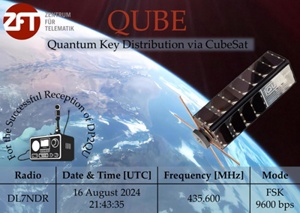We must choose between 4 options to mark a transmitter for IARU Coordination.
- IARU Coordinated
- IARU Declined
- IARU Uncoordinated
- N/A
If you choose “Declined” or “Uncoordinated” the status is set to “Frequency Misuse” and you neither be able to export data from the database nor build dashboards.
Lately, IARU has obviously changed its opinion on what is now necessary to get a frequency coordinated. The criteria are now stricter.
There are satellite operators who already got frequencies of previous missions’s transmitters coordinated and now facing a rejection of their equivalent frequency application.
This is a general problem, but I like to start this thread by a discussion on it from the perspective of the satellite QUBE from the Zentrum für Telematik in Würzburg, Germany.
Already in 2004, Klaus Schilling, at that time professor and chair of Chair of Computer Science VII of the University of Würzburg, got the first UWE satellite IARU coordinated. Three more followed, also successfully coordinated (2,3,4).
In 2019, the Zentrum für Telematik (founded 2007 by Schilling, now its president) applied successfully for IARU frequency coordination for their 4 NetSat satellites.
Only two years later, another equivalent coordination application was submitted - this time for QUBE -, but was quite unexpectedly rejected.
Compared to previous applications, they did nothing wrong. It’s the IARU who changed its requirements for a coordination by being stricter on coordination of mixing of scientific missions with the radio amateur ones.
We currently follow the decision of IARU frequency coordination and mark transmitters as “declined” if IARU did so.
Data won’t be shown on SatNOGS because decoders won’t be used in the database and without decoders, dashboards are impossible. On top data exports are not possible.
As for QUBE, its decoder (already on a merge request), cannot be used in the database.
The also planned dashboard cannot be implemented.
Besides what the team already did for their previous satellites transmitting on amateur radio frequencies:
- planned digipeater functionality
- got ham callsigns
- got their frequency IARU coordinated
- built a decoder
this time in addition they also
- planned special classes to prepare students for the amateur radio exams and for hands-on experience in satellite communications
- send out QSL cards as confirmation for telemetry reception
We now can leave the transmitter marked as “declined” (based on IARU’s decision) and show the team our “appreciation” or we can - and we are free to do so - change the transmitter to “N/A” which opens up possibilites for both sides, for the amateur radio community and for the QUBE team.
Fact is, the amateur radio and its satellite community need satellite providers like the QUBE team.
They support us, we should do the same for them.
I’m looking forward to your comments.
Daniel, dl7ndr

